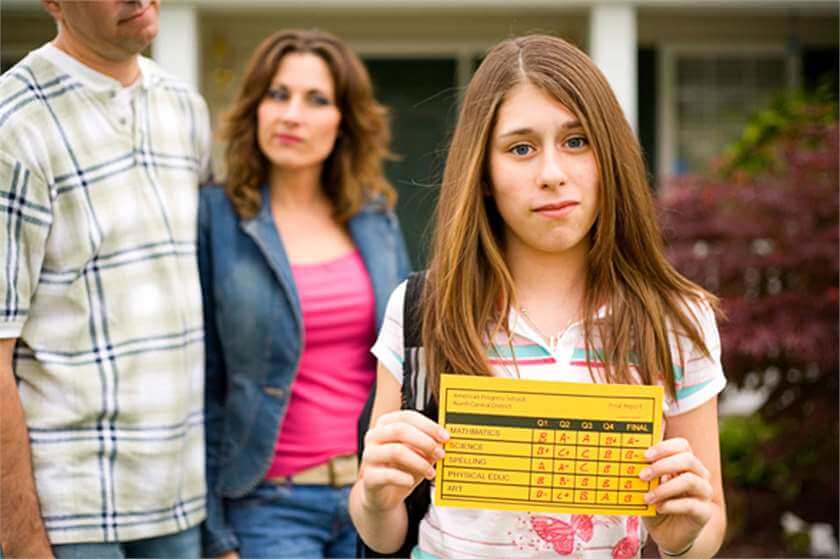9 tips to deal with your child’s bad report card

A bad report card doesn’t mean it is the “End of the world”. Kids education is becoming competitive. We being parents will always want our kids to get “A” in academics, and expect that our kids should be pro at extracurricular activities as well – in short, a versatile child. Well, are we thinking surreal?
When your child brings home a bad report card, our first reaction is to punish or yell at them. Isn’t it? As if getting angry or punishing could help your kid get “A+” in his/her report card. Well, that’s not going to happen, it will worsen the situation for sure. Remember when you are raising children; your behavior towards them will have a severe impact on their little minds which will hinder in various aspects of their life while growing up.
Listen earnestly what your child wants to tell you, the things that are burdening them down and their struggles with their subjects and so on. It is important that they find comfort talking to you.
So, let’s explore the ways that you can utilize in these kinds of parenting situations.

Understanding The Grading System:
Are you aware of the school’s grading system? Every school will vary in their report card ratings and lexicon. Before reacting to your child’s report card, it is important that you understand how the school measures the grades. For e.g. certain schools have a numeric system when it comes to giving grades i.e. rating is 1 to 5. 1 is poor and 5 stars mean excellent. Whereas some schools have an alphabetical grading system, for e.g. A stands for Excellent and D stands for ‘Fail’.
What looks like an average or a fulfilling report card could turn out to be a bad one when you haven’t understood it well and gave the bashing.
The grading system in Indian school varies somewhat depending on the school and the board (State board/ CBSE/ ICSE)
The most predominant form is a percentage grading system. However; the majority of the schools follow the most common ones which are:
Grade scale 60.00 – 100.00 – First class division/ First Class
Grade scale 50.00 -59.00 – Second class division/ Second Class
Grade scale 40.00 – 49.00 – Third Class/Third Division/Pass Class
Grade scale 0.00 – 39.00 – Below Minimum Pass
However; there is slight variation amongst the school which follows 10 -point grading scale.
| Scale | Grade Description | Grades |
| 10 | Outstanding | A+ |
| 9 | Excellent | A |
| 8 | Very Good | B+ |
| 7 | Good | B |
| 6 | Above Average | B- |
| 5 | Average | C |
| 4 | Pass | D |
| 0 | Fail | F |
Know How Grades Are Weighted:
This is another aspect of grading and it differs from school to school. Some school teachers lay emphasize on homework, project and extracurricular activities, while for some, it is only the test scores that matter.
Hence, when your child excels at his/her projects, homework or other activities but isn’t doing well in tests, the grades are surely going to reflect in the report card. The reason behind this might be the lack of understanding the subjects.

Ways To Deal With Bad Report Cards:
1. Discuss, don’t lecture!
Be patient with your kid to know why the grades have gone down. This will help you figure out where` your kid is lacking and how you can help improve their grades. Your kids are feeling pressured in fulfilling your expectations. And they fear that they might let you down if failed to perform.
This will have a negative impact on their mind hence; will affect not only studies but also various aspects of their life. Communication is the key and not lecturing. Do not humiliate even if it’s a bad report card, rather let them know that you are with them and make them understand the importance of hard work, and how they will eventually turn the bad report card into a good one.
2. Identify and acknowledge motivational patterns:
There is more than a report card that you should be proud of. It can be about the neatness in their homework, creativity in their projects or 100% attendance. Praise them when they help people for various school projects and so on. Let your child know that you appreciate their efforts; this will give them a boost in improving the bad grades of their report card.
3. Determine whether this is unusual or showing a trend:
Very calmly, and in a very non-judgmental way, ask your child to be vocal about their thoughts. This is a sign of good parenting. Ask how they are feeling and what went wrong behind getting bad report card grades.
It is important to include your child in the discussion, giving them a chance to share how they feel about it. Ask them whether they have any plan ready to improve their poor grades. It is also important to find out if there is an underlying problem, making them feel upset in school.
4. Seek help from their teachers:
You can request the school teacher concerning about your child’s bad report card. The teacher is the right person to highlight your child’s academic weaknesses and share tips to overcome the same. Consider the teacher’s opinions as a partner in your child’s skill development. It is wrong to blame the school teachers when they genuinely want their kids to do academically well.

5. Ask their opinion on what to do next:
Make it look like a great learning opportunity for both, you and your kid. Figure out potential solutions and show them that you are here to help. If your kids need tutoring, arrange for one or just help them by design a timetable. This will help them, focus on weaker subjects and soon you’ll see improvisation.
6. Listen to your child:
Do not jump to conclusion. Rather, take time to listen and understand what your kids want to tell you. There can be something that bothers your child, and as a parent, we need to take care of this delicate situation so that your child finds it comfortable to share it with you. You won’t come to know what is hindering them until you ask.
7. Create a plan with him/her:
Having realistic goals is important. Know your child’s capabilities; expecting them to jump from grade “C” to directly grade “A” is unrealistic. It is probably too much to ask, rather setting up a step by step process to reach higher grades can help them boost their confidence in their academics.

8. Avoid conflicts:
Blaming and shaming will only make things worse. Statements that are used to confront your child may have a huge impact on damaging their self-esteem. It is important to have a positive and open-minded conversation when you are both in the right condition to talk. This will remove the bitterness and build a comfort level between you two, boosting their moral support.
9. Help them get organized:
Your job is still incomplete until you have assisted your child with the kind of support and care he/she needs to improve the grades. Make sure that your child gets the homework done on time. Review their studying strategies during exams and make changes accordingly. Take time to really hear what your kid has to say. Let them know that their talking makes sense and when they are ready to shift into problem-solving mode, help them identify the possible solutions.
If there is a need to contact a teacher, do it. If there is a need for tutoring/coaching class; arrange for them. If there is a need to have them outline their time management, sit down and do it. Your child is your priority and they are counting on you for any kind of help.
Want to get more insight into how to enhance your child’s peak performance? Watch this video now!




